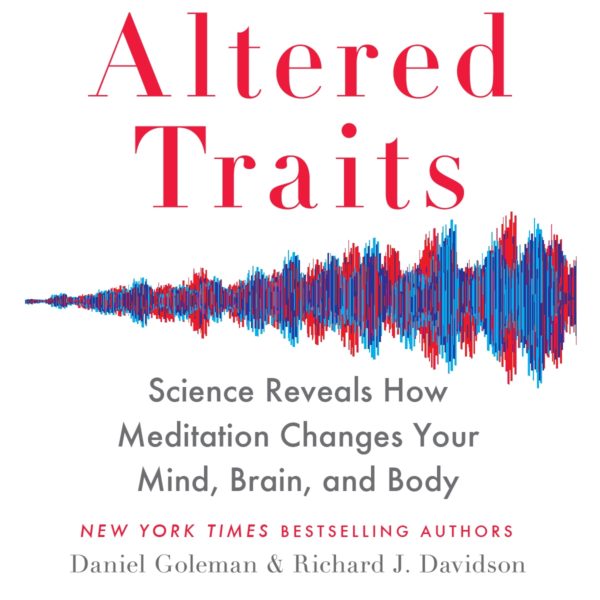
Center for Healthy Minds Founder and Director Richard Davidson is determined to share how meditation can be helpful as well as where it falls short. In his new book, “Altered Traits: Science Reveals How Meditation Changes Your Mind, Brain and Body” authored with longtime friend and emotional intelligence expert Daniel Goleman, Davidson brings these issues to light and shares how decades of research at the Center for Healthy Minds has contributed to our understanding of meditation, and more importantly, our well-being and flourishing.
There’s been a lot of focus on the kinds of “states” a person may experience while meditating. What does your focus on “altered traits” mean?
When we talk about traits, we’re implying qualities that endure. And when we think about meditation, or for that matter other kinds of interventions, we’re really interested in the impact of the intervention on a person’s quality of experience and whether that effect lasts. If meditation were to simply give you a buzz — like a drug – you’d have the same effect as a drug and your experience will wear off and return to baseline.
If this is also true of meditation, then what would be the point? We’re finding that this is not the case, and there’s more to it than a singular experience for people who meditate regularly. The central focus of these practices is to alter traits, and it’s a fundamental reason why they evolved in the first place.
So far, the scientific literature, including our earlier work, has focused more on states than traits. This is because it’s an easier and not unreasonable place to begin. Yet, traits are really coming to the forefront as being more important.
One of key things we do in this book is to look dispassionately at the state of evidence. Is there evidence to suggest that different meditations can lead to changes that endure? One conclusion is that there is some evidence that meditation leads to changes in traits, but that ongoing practice is required and is an important attribute. We’re finding that changes in traits go hand-in-hand with new habits so the practices are consistent over time.
"There’s a lot of hype about meditation, and one of the things we do in this new book is hopefully help correct the misperception that you can use meditation to 'fix' something in your life or in yourself."
What traits are changed by meditation?
There are a number of them, but the ones we have the most evidence for are equanimity, prosocial behavior and the relationship to the self. For equanimity, we’re referring to systematic enduring changes in emotional regulation – our ability to calm down when upset or angry, and to recover from adversity.
The second trait that we see evidence for is in the domain of prosocial behavior that includes qualities like kindness and compassion. One example is implicit bias, which is a really big one for issues that are germane to our national culture today. There is some evidence to suggest that simple forms of lovingkindness meditation can lead to enduring changes in implicit bias, seeing those that are different from you as not necessarily belonging to an out-group.
The third area where the evidence for meditation is compelling is the ability to change one’s relationship to the self, particularly to the self-narrative. We all carry a narrative about who we are in our heads, and the extent to which we take this narrative as a truthful representation of reality – how much we reify and solidify it – can create problems and a distorted view of yourself and others. We’re finding that meditation loosens the grasp of this narrative and allows it to be more permeable. This is important for improving well-being, and we see it as an enduring change that comes about with long-term meditation practice.

We hear a lot about what meditation does do. What doesn’t it do?
This is a really important question. There’s a lot of hype about meditation, and one of the things we do in this new book is hopefully help correct the misperception that you can use meditation to “fix” something in your life or in yourself. Meditations doesn’t fix anything, period. It’s not designed to do that. Meditation also isn’t about clearing your mind or stopping your thoughts. It’s certainly not a panacea or a one-size-fits-all.
You and co-author Dan Goleman describe how many directions you took while doing research were inspired by firsthand experience. When did this pay off for you personally and lead to a new line of scientific investigation?
One of the more straightforward examples is my experience cultivating qualities like resilience and outlook. Resilience is the rapidity with which someone recovers from adversity, and I’ve found this quality to be significantly improved by my meditation experience over a long period of time – it certainly wasn’t instantaneous, and I’m by no means a shining example in this regard. But I think I’ve gotten a little better at being able to recover from adversity, and one of the things we like to say to paraphrase the bumper sticker, is that “Stuff Happens,” and you can’t change what happened, but you can change how you relate to it. I’ve learned not to get bent out of shape by each adversity; taking it all in would be toxic. Building my ability to cope with adversity on a personal level has motivated me to investigate it scientifically.
The flip side of this is outlook — being able to stand in the face of anything and say “Everything is basically OK.” By having a positive outlook even while the world is falling apart, I think it’s possible to envision a future where things are different. We can hold on to a positive view in a way that is not naïve, but unshakable. It’s powerful and allows you to jump into the fire and be OK about it.
Interview conducted and edited by Marianne Spoon






